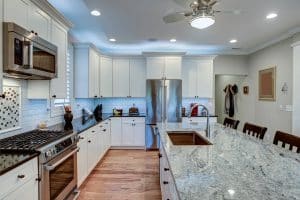
High-end countertops are becoming the go-to trend for new home constructions and those looking to upgrade their kitchens. But with so many options on the market, it can be hard to know which materials to choose from. Here is a look at the pros and cons of two of the most popular countertop materials used in new home construction — granite and quartz.
The Pros and Cons of Quartz
It’s estimated that 40% of remodeled homes in the US used quartz countertops, making it the most popular of the materials listed. Homeowners choose quartz for their countertops because it is cost effective, durable, long lasting, and environmentally friendly.
Unlike granite, the quartz found in kitchen countertops is not 100% naturally formed stone. It’s typically a mixture of 90%–95% raw quartz and 5%–10% polymer resin. As a result, quartz is easier to manipulate and customize. Quartz countertops offer numerous benefits yet are priced competitively with other high-end materials such as granite and marble. They also offer a greater range of colors and finishes, making them easy to customize to meet your individual tastes.
The mineral is also known to stand up against spills and prevent bacteria and viruses from forming inside it. Plus, it is slightly more malleable than granite and isn’t known to break or crack quite as easily. If properly maintained, quartz countertops can last a lifetime, and many manufacturers offer warranties to that effect.
Not to mention, quartz is a common mineral found all over the world, which means it doesn’t use as much energy being transported as granite. Plus, it’s often made with recycled materials, meaning it is generally more environmentally friendly than granite and other naturally formed stones that have to be shipped from remote locations.
But for all their benefits, quartz countertops do have their negatives. For instance, they are not as heat resistant as granite. So, it’s not advised to use quartz countertops in an outdoor setting. Plus, they can burn more easily if you accidentally leave a hot pan on the counter or otherwise expose them to extreme heat. Quartz countertops can often be difficult to install, and there may be size limitations because of how they are manufactured. Naturally occurring stones like granite do not come with those types of limitations because they can be cut directly from the raw stone.
But overall, quartz countertops are durable, low maintenance, and easy to customize, which is what has made them a common fixture in modern American households.
The Pros and Cons of Granite
After quartz, granite is the second most common countertop material used for remodeled homes in the US. Unlike the number one contender, granite countertops are made from raw granite that is shaped and treated with a finish. Although not as easy to customize as quartz, granite on its own has a stunning look that many homeowners love, which is why it’s become so popular.
Granite countertops share many of the advantages of quartz. They are priced competitively with the other material, depending on the manufacturer. They are also durable and nonporous, meaning they stand up well to spills, scratches, scuffs, and other wear and tear that often occurs in the kitchen. Plus, granite is much more heat resistant than quartz, and you can place a hot pan directly on the surface without doing damage to the countertop. They also resist bacteria and dirt and have an earthier, more natural look that is tough to replicate. Not to mention they can add resale value to your property, especially if you are replacing out-of-date wood or metal countertops.
However, granite countertops do have their drawbacks. There are very few variations in color or style because they are cut from raw stone and not mixed with any additives. They tend to chip or break more easily than quartz and can be costly to repair. As a result, the warranties on granite countertops tend to be more limited than those on quartz. Also, the process of mining and transporting granite is more involved and requires more energy, which can drive up costs and use more fossil fuels, making it worse for the environment. Not to mention granite slabs can be quite heavy and require a professional to install.
But overall, they are a tasteful, elegant kitchen feature that is also functional and built to last. They offer many of the benefits of quartz with only a few added drawbacks, which makes them a smart choice for any remodel. If you are thinking about remodeling your kitchen or building a new home and need advice on which material makes sense for your tastes and budget, come see us at Wholesale Granite Direct. We are experts in the home construction industry, and we are happy to answer any questions you have about building materials or the services we offer.

